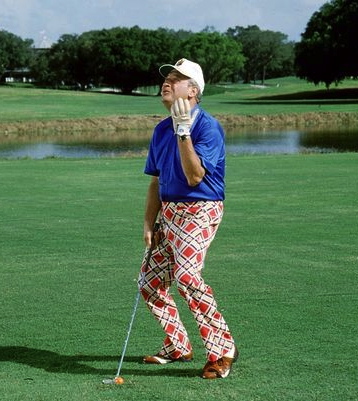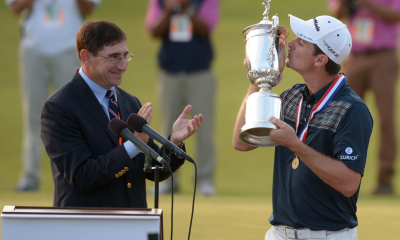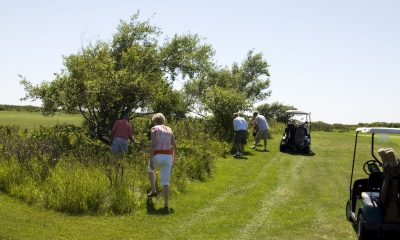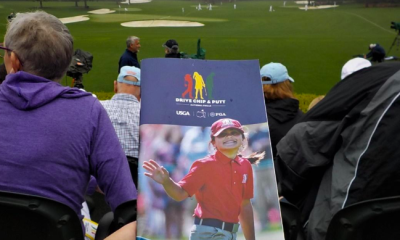Opinion & Analysis
USGA launches “While We’re Young” campaign to combat slow play

[youtube id=”2KuPwbN-UIc” width=”620″ height=”360″]
The USGA has recently launched a campaign aimed to help grow the game of golf by improving pace of play on the golf course. The campaign is called “While We’re Young” after the famous line from Rodney Dangerfield’s character in Caddyshack. While the title may be light-hearted, the message is clear: pick up the pace.
The campaign will air a series of public service announcements during this week’s U.S. Open that feature Tiger Woods, Arnold Palmer, Clint Eastwood, Paula Creamer, Annika Sorenstam and Butch Harmon (watch Tiger’s in the video at the top of the page).
“Pace of play is a big issue,” Woods said in a statement. “Rounds of golf take too long and no one enjoys it. ‘While we’re young’ is part of the golfing vocabulary, and Caddyshack is iconic in our sport. This campaign is lighthearted, but it also shows that we need to pick up the pace of play.”
According to the USGA, 91 percent of serious golfers are bothered by slow paces of play and say it detracts from their golf experience.
There is no reason that a foursome that walks 18 holes should not be able to get around the course in less than four hours and ten minutes. I work at a club as a Club Professional, and we have a very strict pace of play in which each hole must be completed after a certain amount of time after the group’s starting time. Our members routinely get around the course in under four hours, which greatly increases their enjoyment of their day at the course.
The next time you play, please help everyone on the course enjoy their day by following a few of these easy guidelines for speeding up pace:
- Play READY golf; be ready to play when it is your turn.
- Read your putt while others are putting.
- Walk ahead as far as is safe. DO NOT move as a group from shot to shot.
- Play the set of tees that are appropriate for you, no matter what tees everyone else is playing.
- Limit your time at the turn to five minutes.
- Do all scorekeeping on the teeing ground of the next hole, NOT on the green of the current hole.
- If you are the first or second person to finish the hole, put your clubs away and be ready to go to the next hole, let the third person to finish put the flagstick back in.
- Set your clubs (or park your cart) between the flagstick and the next tee box to minimize time between holes.
- Golf is a social game, but limit socializing to times when it is appropriate such as the putting green and teeing ground (when the group is closer together), but do so in a manner so as to not slow down the progress of the group.
- Be an athlete, walk fast.
- When on carts, be willing to take many clubs and walk to your ball if your riding partner is not near you, do not wait for the partner to bring the cart to you.
- Remember that USGA handicapping allows you to pick up your ball if you are having a bad hole. You should never putt for more than an eight.
- Help the others in your group, watch everyone’s shots and track them so they can quickly find them.
- Remember that your place on the golf course is directly behind the group in front of you, NOT in front of the group behind you!
Have other ideas? Please feel free to add to the list in the Comments section at the bottom of the page.
We are constantly losing golfers simply because pace of play takes away from their enjoyment of the game. Please visit http://www.usga.org/MicroSite.aspx?id=21474856307 for more information about the initiative and take the pledge today to become a USGA pace of play ambassador. The golf world will thank you!
Opinion & Analysis
The 2 primary challenges golf equipment companies face

As the editor-in-chief of this website and an observer of the GolfWRX forums and other online golf equipment discourse for over a decade, I’m pretty well attuned to the grunts and grumbles of a significant portion of the golf equipment purchasing spectrum. And before you accuse me of lording above all in some digital ivory tower, I’d like to offer that I worked at golf courses (public and private) for years prior to picking up my pen, so I’m well-versed in the non-degenerate golf equipment consumers out there. I touched (green)grass (retail)!
Complaints about the ills of and related to the OEMs usually follow some version of: Product cycles are too short for real innovation, tour equipment isn’t the same as retail (which is largely not true, by the way), too much is invested in marketing and not enough in R&D, top staffer X hasn’t even put the new driver in play, so it’s obviously not superior to the previous generation, prices are too high, and on and on.
Without digging into the merits of any of these claims, which I believe are mostly red herrings, I’d like to bring into view of our rangefinder what I believe to be the two primary difficulties golf equipment companies face.
One: As Terry Koehler, back when he was the CEO of Ben Hogan, told me at the time of the Ft Worth irons launch, if you can’t regularly hit the golf ball in a coin-sized area in the middle of the face, there’s not a ton that iron technology can do for you. Now, this is less true now with respect to irons than when he said it, and is less and less true by degrees as the clubs get larger (utilities, fairways, hybrids, drivers), but there remains a great deal of golf equipment truth in that statement. Think about it — which is to say, in TL;DR fashion, get lessons from a qualified instructor who will teach you about the fundamentals of repeatable impact and how the golf swing works, not just offer band-aid fixes. If you can’t repeatably deliver the golf club to the golf ball in something resembling the manner it was designed for, how can you expect to be getting the most out of the club — put another way, the maximum value from your investment?
Similarly, game improvement equipment can only improve your game if you game it. In other words, get fit for the clubs you ought to be playing rather than filling the bag with the ones you wish you could hit or used to be able to hit. Of course, don’t do this if you don’t care about performance and just want to hit a forged blade while playing off an 18 handicap. That’s absolutely fine. There were plenty of members in clubs back in the day playing Hogan Apex or Mizuno MP-32 irons who had no business doing so from a ballstriking standpoint, but they enjoyed their look, feel, and complementary qualities to their Gatsby hats and cashmere sweaters. Do what brings you a measure of joy in this maddening game.
Now, the second issue. This is not a plea for non-conforming equipment; rather, it is a statement of fact. USGA/R&A limits on every facet of golf equipment are detrimental to golf equipment manufacturers. Sure, you know this, but do you think about it as it applies to almost every element of equipment? A 500cc driver would be inherently more forgiving than a 460cc, as one with a COR measurement in excess of 0.83. 50-inch shafts. Box grooves. And on and on.
Would fewer regulations be objectively bad for the game? Would this erode its soul? Fortunately, that’s beside the point of this exercise, which is merely to point out the facts. The fact, in this case, is that equipment restrictions and regulations are the slaughterbench of an abundance of innovation in the golf equipment space. Is this for the best? Well, now I’ve asked the question twice and might as well give a partial response, I guess my answer to that would be, “It depends on what type of golf you’re playing and who you’re playing it with.”
For my part, I don’t mind embarrassing myself with vintage blades and persimmons chasing after the quasi-spiritual elevation of a well-struck shot, but that’s just me. Plenty of folks don’t give a damn if their grooves are conforming. Plenty of folks think the folks in Liberty Corner ought to add a prison to the museum for such offences. And those are just a few of the considerations for the amateur game — which doesn’t get inside the gallery ropes of the pro game…
Different strokes in the game of golf, in my humble opinion.
Anyway, I believe equipment company engineers are genuinely trying to build better equipment year over year. The marketing departments are trying to find ways to make this equipment appeal to the broadest segment of the golf market possible. All of this against (1) the backdrop of — at least for now — firm product cycles. And golfers who, with their ~15 average handicap (men), for the most part, are not striping the golf ball like Tiger in his prime and seem to have less and less time year over year to practice and improve. (2) Regulations that massively restrict what they’re able to do…
That’s the landscape as I see it and the real headwinds for golf equipment companies. No doubt, there’s more I haven’t considered, but I think the previous is a better — and better faith — point of departure when formulating any serious commentary on the golf equipment world than some of the more cynical and conspiratorial takes I hear.
Agree? Disagree? Think I’m worthy of an Adam Hadwin-esque security guard tackle? Let me know in the comments.
@golfoncbs The infamous Adam Hadwin tackle ? #golf #fyp #canada #pgatour #adamhadwin ? Ghibli-style nostalgic waltz – MaSssuguMusic
Podcasts
Fore Love of Golf: Introducing a new club concept

Episode #16 brings us Cliff McKinney. Cliff is the founder of Old Charlie Golf Club, a new club, and concept, to be built in the Florida panhandle. The model is quite interesting and aims to make great, private golf more affordable. We hope you enjoy the show!
Opinion & Analysis
On Scottie Scheffler wondering ‘What’s the point of winning?’

Last week, I came across a reel from BBC Sport on Instagram featuring Scottie Scheffler speaking to the media ahead of The Open at Royal Portrush. In it, he shared that he often wonders what the point is of wanting to win tournaments so badly — especially when he knows, deep down, that it doesn’t lead to a truly fulfilling life.
View this post on Instagram
“Is it great to be able to win tournaments and to accomplish the things I have in the game of golf? Yeah, it brings tears to my eyes just to think about it because I’ve literally worked my entire life to be good at this sport,” Scheffler said. “To have that kind of sense of accomplishment, I think, is a pretty cool feeling. To get to live out your dreams is very special, but at the end of the day, I’m not out here to inspire the next generation of golfers. I’m not out here to inspire someone to be the best player in the world, because what’s the point?”
Ironically — or perhaps perfectly — he went on to win the claret jug.
That question — what’s the point of winning? — cuts straight to the heart of the human journey.
As someone who’s spent over two decades in the trenches of professional golf, and in deep study of the mental, emotional, and spiritual dimensions of the game, I see Scottie’s inner conflict as a sign of soul evolution in motion.
I came to golf late. I wasn’t a junior standout or college All-American. At 27, I left a steady corporate job to see if I could be on the PGA Tour starting as a 14-handicap, average-length hitter. Over the years, my journey has been defined less by trophies and more by the relentless effort to navigate the deeply inequitable and gated system of professional golf — an effort that ultimately turned inward and helped me evolve as both a golfer and a person.
One perspective that helped me make sense of this inner dissonance around competition and our culture’s tendency to overvalue winning is the idea of soul evolution.
The University of Virginia’s Division of Perceptual Studies has done extensive research on reincarnation, and Netflix’s Surviving Death (Episode 6) explores the topic, too. Whether you take it literally or metaphorically, the idea that we’re on a long arc of growth — from beginner to sage elder — offers a profound perspective.
If you accept the premise literally, then terms like “young soul” and “old soul” start to hold meaning. However, even if we set the word “soul” aside, it’s easy to see that different levels of life experience produce different worldviews.
Newer souls — or people in earlier stages of their development — may be curious and kind but still lack discernment or depth. There is a naivety, and they don’t yet question as deeply, tending to see things in black and white, partly because certainty feels safer than confronting the unknown.
As we gain more experience, we begin to experiment. We test limits. We chase extreme external goals — sometimes at the expense of health, relationships, or inner peace — still operating from hunger, ambition, and the fragility of the ego.
It’s a necessary stage, but often a turbulent and unfulfilling one.
David Duval fell off the map after reaching World No. 1. Bubba Watson had his own “Is this it?” moment with his caddie, Ted Scott, after winning the Masters.
In Aaron Rodgers: Enigma, reflecting on his 2011 Super Bowl win, Rodgers said:
“Now I’ve accomplished the only thing that I really, really wanted to do in my life. Now what? I was like, ‘Did I aim at the wrong thing? Did I spend too much time thinking about stuff that ultimately doesn’t give you true happiness?’”
Jim Carrey once said, “I think everybody should get rich and famous and do everything they ever dreamed of so they can see that it’s not the answer.”
Eventually, though, something shifts.
We begin to see in shades of gray. Winning, dominating, accumulating—these pursuits lose their shine. The rewards feel more fleeting. Living in a constant state of fight-or-flight makes us feel alive, yes, but not happy and joyful.
Compassion begins to replace ambition. Love, presence, and gratitude become more fulfilling than status, profits, or trophies. We crave balance over burnout. Collaboration over competition. Meaning over metrics.
Interestingly, if we zoom out, we can apply this same model to nations and cultures. Countries, like people, have a collective “soul stage” made up of the individuals within them.
Take the United States, for example. I’d place it as a mid-level soul: highly competitive and deeply driven, but still learning emotional maturity. Still uncomfortable with nuance. Still believing that more is always better. Despite its global wins, the U.S. currently ranks just 23rd in happiness (as of 2025). You might liken it to a gifted teenager—bold, eager, and ambitious, but angsty and still figuring out how to live well and in balance. As much as a parent wants to protect their child, sometimes the child has to make their own mistakes to truly grow.
So when Scottie Scheffler wonders what the point of winning is, I don’t see someone losing strength.
I see someone evolving.
He’s beginning to look beyond the leaderboard. Beyond metrics of success that carry a lower vibration. And yet, in a poetic twist, Scheffler did go on to win The Open. But that only reinforces the point: even at the pinnacle, the question remains. And if more of us in the golf and sports world — and in U.S. culture at large — started asking similar questions, we might discover that the more meaningful trophy isn’t about accumulating or beating others at all costs.
It’s about awakening and evolving to something more than winning could ever promise.





















chuck
Jul 14, 2013 at 3:53 pm
Play the regular white tees not the tips.
i play with a guy who out drives me by 50 yards off every tee, but my handicap is 10 strokes lower than his. should i play off shorter tees?
No Way
Xander Walsh
Jul 8, 2013 at 7:29 pm
Clint’s PSA should involve a .44 magnum and the infamous phase “Do you feel lucky? Well do ya punk?”
naflack
Jun 30, 2013 at 4:20 pm
the best example is the tour players and until the rules apply to them there will be marginal changes if any…
i understand the campaign and think it is well intentioned.
that said, if you want to grow the game then it needs to be more friendly to the fringe players. this campaign isnt aimed at making the experiance better for the fringe players, its aimed at making the experiance better for the better player. until courses stop putting groups out on top of each other this is nothing more than a well intentioned band aid. i am a good player who enjoys the game but i play with people from time to time who are not good players and the experiance is quite intimidating. many times they are picking up their ball when they have played decent shots simply because there are people waiting on them because the tee times are piled on top of each other. oddly enough these friends of mine dont enjoy the game or the experiance and feel like their money is being taken away from them without the opportunity to do what they have spent their hard earned money to do…hit the ball and enjoy their round.
chastise me if you will, i dont care…my friends will be welcomed when they play with me to play their ball and have fun and when people catch us we let them play through.
again i understand the frustrations of slow play as much as the next guy but lets hold the courses accountable for their role in this problem.
Brad
Jun 21, 2013 at 6:58 pm
Baaaaaa! Goes another sheep….if my slow play throws off your “rythm” maybe YOU should play a different sport. Golf is going to be slow until people realize that speed is not the answer. Chill the F#@~ out is the answer. Take your time. Golf is not about slamming tee times every ten minutes. Golf is supposed be a leisure game, not an olympic event. Stay of your meds and relax…enjoy your 60$ walk through the beautiful scenery that grew and exists for free.
naflack
Jun 30, 2013 at 4:20 pm
+1
MTRyaninTX
Jun 18, 2013 at 10:57 am
Okay… Those greedy corporate monsters that just rake in the cash by owning golf courses, could you point them out to me? How much do you pay to water your lawn? Do you mow your 200 acres every day? What does that cost you? How many golf carts are you replacing a year? Spare me.
This is a great campaign. I think everyone who plays is conscientious of a few things 1. Cost – golf is too expensive, but it’s what the market bears, you want to play less, go play south city goat track and don’t complain about the greens and pace. 2. Overall enjoyment, if you get enjoyment over dragging your round out or taking all of your allotted time while people are staring at you from the tee, fairway, etc. you are in the wrong game. I know that if I’m slowed down and have to wait on someone then have someone wait on me my rhythm is shot and I’m useless.
You’re “stick it to the man” idea of slowing down to punish profit only punishes every other person on the course.
Last point – the fastest way to watch your quality of course go down and price go up is to start screwing with profit.
yo!
Jun 18, 2013 at 3:23 am
a three-some at the us open takes 5+ hours to finish a round, and the usga wants amateurs to play fast
naflack
Jun 30, 2013 at 4:23 pm
+1
Golfergal
Jun 17, 2013 at 12:23 pm
How about banning fivesomes on the weekends? Very few public courses or private clubs in some parts of the country ban the “good ole boy” groups of five who have always played together and are now in their 80’s or who are playing for money and take forever on the greens.
sasojo
Jun 17, 2013 at 9:49 am
Asians are the slowest lol.
yo!
Jun 18, 2013 at 3:24 am
and they can’t drive …
Gary Forcey
Jun 17, 2013 at 9:38 am
Improper use of golf carts is also a problem. On the way to your ball, select more than one club if you’re unsure of what to hit and then start walking or driving toward the hole and/or your cart partner immediately after hitting. This is particularly important when conditions dictate “cart path only” restrictions. Whenever possible, park the cart between the pin and the next tee – never in front of the green so you can move quickly to the next hole and never stop to mark scores. That can wait until the tee.
Hunterdog
Jun 16, 2013 at 6:13 pm
I belong to a semi-private facility foe pace of play on the weekends. Weekday golf is essentially non-existent; hardly anyone on the private or public courses. We have a terrific public course, it hosts a Senior PGA event, and gets a lot of weekend play and is very good condition. The fairways are tree lined and the rough is deep and thick. Alot of time is spent searching for balls a couple of yards off the fairway. A lower rough cut would save 20 minutes a round. Help us out supers!
Marylou
Jun 16, 2013 at 1:39 pm
You must be kidding! This campaign is created under the guise of helping golfers not get frustrated. That’s what the “playing through” courtesy was created for. Am I the only person who sees that it is blatantly obvious that it’s a way to shove as many golfers as possible through the course so golf course owners can make more of a profit? C’mon! Now I’m determined to play EXTRA slow!
SanDiegoSteve
Jun 16, 2013 at 2:35 pm
I couldn’t agree more Marylou! I am going to slow it down. Fair warning, pull that “While we’re young” crap with me and you will regret it!
naflack
Jun 30, 2013 at 4:25 pm
+1…lol
Slimbeezee
Jun 16, 2013 at 4:33 pm
Absolutely agreed Marylou…the usga also launched this crap nationally while there whining cause they “lost” $10 million at the us open. There are already rules in place for slow play…just enforce them. Don’t need an ad campaign for that.
IsItWinterYet
Jun 16, 2013 at 11:05 pm
Pace of play is certainly a polarizing topic. Like the America we currently live in; no one is ever happy with anything and its always someone’s else’s fault. People feel that they are being screwed out of their hard-earned dimes; the golf course, the Marshall, the lack of Marshall, the rough, too fast, too slow, the pros on TV. If you hate golf so much, might I suggest a different way to recreate. If you think golf is overpriced, play courses you can afford. “Green fees at XYZ Club are too expensive.” Incorrect, they are too expensive for you. I can get a steak at Morton’s or a steak at Applebee’s; both are steaks but very different. Any of you know how much it costs to simply operate a golf course..?
Back to pace, playing through implies that once you play through a group that you will then be able to play at a reasonable pace. What if a course is busy, oh wait, you all hate that too; playing through does zero good. It’s amazing how many “golfers” feel that they are knowledgeable of the inner workings of golf course setup and administration. The course I play at has 10-minute intervals, 1 open/unused tee time every 2 hours and player assistants managing pace and ensuring everyone is enjoying themselves. All balls they find are product of the club and recycled to golfers by player assistants on the course, hopefully eliminating the search time. To say courses are jamming players in is a blanket statement at best. Perhaps you should ask your local club professional before forming an opinion of club policy. You seem to be blind that golf IS a business. What business do you know that is interested in losing money? “Every time I go to the Starbucks, the line is sooo long. Damn, they’re just trying to squeeze/hurry us through to make more profit.”
Play the correct tees, keep pace with the group in front of you and try to have some fun and a little perspective, after all its just golf.
naflack
Jun 30, 2013 at 4:37 pm
i think it is interesting that the perspective from the people who work at a course seems to be is that this is a problem they play no role in.
if all you want is rich people that are good at golf and willing to spend money then best of luck to you.
the reality is that the industry doesnt grow and people are always looking for ways to grow the game. looking for more ways to press the buying public will not work.
show respect to the players around and be humble, if youre slow let people play through and be nice about it.
if you hit a terrible shot and cant find the ball within a minute take your medicine.
beyond that…you paid to play and enjoy the round 🙂
Bob
Jun 16, 2013 at 11:45 am
I agree with this campaign because unessesary slow play is a big problem. People do need to be taught more about golf ediquite. When you’re in a bowling league and it’s your turn do you stop to closely examine every board on the lane, or do you go back to the rack and search for a different bowling ball, do you sit there and finish your hamburger and beer or finish your conversation with your friend, do you take fifteen practice swings first before letting the ball fly? No, of course you don’t! So why do it while golfing? The game is not meant to be played like that. I love the game of golf, its history, its stories and its stars but I hate to say it but alot of this slow play comes from the average player trying to emulate the pros. We see them throwing grass in the air to gauge the wind, having lenghty discussions with their caddies about the shot, changing their minds on what club to use, taking several practice swings, backing off a shot if it doesn’t feel right, circling a putt and looking at it from every possible angle, etc. etc. etc. As much as I hate to say it too many pros are setting a poor example with their slow play. Let’s start at the top in eliminating this problem. Let the pros set a better example!
naflack
Jun 30, 2013 at 4:39 pm
well said…
Schmeggy McGee
Jun 15, 2013 at 3:03 pm
This campaign is terrible. Yes, slow players can be a problem, but slow pace is an inevitable part of public golf. If you have something better to do than being on the golf course, go do that instead. Hackers love to blame their poor scores on outside influences and should practice taking ownership of their 100+ scores. If someone tells me “while we’re young”, I’ll tell them where to shove their club.
Stephen McCloud
Jun 15, 2013 at 2:11 am
I think there are several sides here: 1- guys who know they take too long and 2- guys who are playing fast enough but feel rushed and 3- guys who don’t know they are slow. I don’t think Brad is necessarily the problem. He said he is conscientious but doesn’t like to feel rushed. This ad might be intended for people that play with the #3 people. We all know them and they aren’t even somewhat conscientious like Brad. We need to help the #3 guys see what damage they are causing because although I am defending Brad, he needs to realize that there are also a lot of players that are strapped for cash that DO want to play at a reasonable pace. Sometimes because they dont have a ton of freetime and need to get back to work. Not everyone that is short on funds wants to play a five hour round to get the “most” out of their round. They get their monies worth out of a four hour round.
Brad
Jun 15, 2013 at 12:30 am
Yes I do. What your failing to understand is that what I’m saying is not that I will, purposely, slow play down. My point is that the problem with the decline of interest in golf has nothing to with slow play. I would completely understand if someone spending there hard earned money(and a lot of it)savored the moment a few extra minutes. That’s precisely why I play mid week and have no issues with slow play ever. I think wasting advertising money on an ad campaign about an issue that already has it own set of rules. The time alotted for the pace of play is fair and there are penalties already in place for slow play. So why waste time on something that already is, by the rules, fair. Just enforce…done. Still have a decline in golf now what do you do? Get a clue…
Brad
Jun 14, 2013 at 10:11 pm
Thanks for the comments….shows who the sheep and who the leaders are. I would never listen to a bunch of greedy, corporate monsters just cause they “say” slow play is a problem for golf. The number one reason that I have heard from the hundreds of golfers I come in contact with is that price of golf is a problem. The majority of americans can barely afford food. I would imagine those hundreds of thousands of people would love to just be on a golf course playing no matter how long it took to play. Only the up tight’ “I wish I was an elitist” complainers are the ones you find thinking slow play is why golf is in decline. Get a clue…
Nigel
Jun 14, 2013 at 11:00 pm
Sheep and leaders? I take it you feel you are one of the leaders? Find a lot of golf balls being hit at you? Maybe, just maybe, we call it what it really is… you’re inconsiderate of anybody else. If you want a walk in the park, go for a walk in the park. If you want to play a round of golf, keep up the pace and allow others to enjoy their day as well.
Ps. I’m sure golf is the last thing someone who can’t afford to eat is thinking about. I think you need to get a clue. Now troll along somewhere else.
naflack
Jun 30, 2013 at 4:45 pm
i am someone who likes to play quickly but play with people on occasion who arent very good. they do the best they can and we let people play through. there is never a reason to hit into a group, that is the mentality of a bully.
Ray
Jun 14, 2013 at 10:08 pm
This is a great campaign. How hard is it to bring a couple of clubs from the cart instead of going back and forth because you picked the wrong one? If people bothered to care about the people in the foursome behind them my next round would be a lot more fun.
Greg
Jun 14, 2013 at 8:40 pm
“Ready golf” is play when you are ready – ie don’t be pedantic about whose turn it is. This is especially on the tee, where the longest driver may have the honour and waits for the group in front to be 300 yards away, meanwhile his three shorter-hitting partners could have all hit while he was waiting.
It’s a great way to get almost a hole behind before you’ve teed off the first.
Paul
Jun 16, 2013 at 10:03 am
I’ve seen the waiting on the tee for this reason many times!!!!!
Nigel
Jun 14, 2013 at 8:07 pm
One thing to remember is Brad is the problem. He also, in his complete selfishness, causes a whole lot of undue anger and frustration on the course as it backs up behind him.
Crazy Canuck
Jun 14, 2013 at 8:38 pm
I find I play my best golf when there is a good pace. Nothing kills my game more than having to wait to hit on every shot.
ski_co
Jul 3, 2013 at 12:28 pm
The thing to remember – you are at the course to play golf, not sightsee, hit on the beverage cart girl, and have conversations about the weather with your golfing buds. One practice swing, hit the ball, move on.
kevin
Jun 14, 2013 at 7:53 pm
I agree with Roger. Brad is a terrible golfer and should be banned from all courses.
Brad
Jun 14, 2013 at 5:50 pm
One thing to remember is we are paying $50-80 for one round of golf. I take my time on a golf course because the last thing I’m going to do is over pay for a round and then let them hustle me through so they can stuff as many golfers(all of which are over paying) on the golf course. All the while they blame me the “slow player” and completely ignore the real problem, If I’m going to over pay I am going to get my money’s worth. Sorry but I’ll let ya play through.
Rex
Jun 19, 2013 at 9:29 pm
Golfers with that attitude are not welcome at any golf course in the world.
naflack
Jun 30, 2013 at 4:49 pm
if my group is slow we will let you play through and be resectful about it, beyond that we have paid to be here. im with brad…
Geoff
Jun 14, 2013 at 12:32 pm
I often wonder why golf courses don’t provide an incentive to play faster.
For instance, why don’t golf courses charge a regular greens fee and give money back to players who finish in less than 4 hours. For instance, if greens fees are $50 then a golf course should give back $10 to each group completed in less than 4 hours. I would think the pace of play would increase dramatically. If you want to motivate someone to do something, give them a little cash incentive.
One drawback is that players stuck behind a slow group would be penalized for waiting. That said, I guarantee that no matter the outcome, slow play would be talked about a lot more than it is now. And slow players would get a little kick in their ass to play a faster golf. One possible positive: courses that advocate faster play might see an increase in golfers because of the reputation for fast play.
Slow play prevents me from doing anything other than practicing. I don’t have time to wait around on a golf course. Hopefully someone solves this slow play problem.
bleda2002
Jun 14, 2013 at 12:22 pm
One thing that can go a long way to helping pace of play is with the courses themselves. I’ve played on some courses that thought they were preparing for the US Open with no first cut of rough, instead its 5-7 inch thick primary rough right off the edge of the fairway guaranteed to swallow any ball that even rolls in to it. Nothing wastes time and frustrates like combing a 10 yard space for a ball you know is there but cant find because you’re crawling through a jungle.
Rex
Jun 19, 2013 at 9:35 pm
Always putt out is another time saver….don’t mark your ball after EVERY putt. If you CAN putt out by not standing on anyone else’s line of putt do so to speed up the putting time for the entire group.
BTW…line of putt is not the same as line to the hole….too many people straddle the line to the hole thinking they are doing the right thing…only to be planting their big size 10s right on the line of the putt.
sturg
Jun 14, 2013 at 9:32 am
The biggest reason for slow play is that the majority of weekend players (at public courses) simply aren’t good enough to be playing.
Go to the first tee box of any public course on a Saturday morning — you’ll see a litany of dribblers/OB drives
Paul
Jun 16, 2013 at 10:00 am
I saw/heard that Sweden requires a “playing license” before your’re allowed on a golf course to ensure you know the etiquette of golf and keeping up.
john tobler
Jun 25, 2013 at 4:18 pm
in switzerland, you’ve got to have at least a hcp of 36 to play on a 18 hole course. but believe me. the pace of play still isn’t very fast.